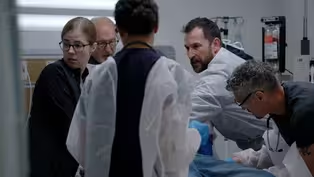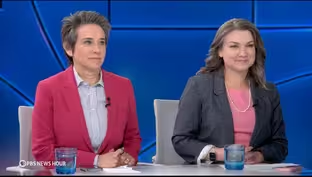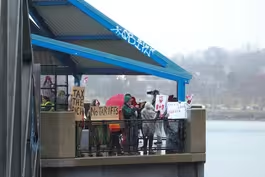
Businesses face impacts of Trump's tariff policies
Clip: 4/7/2025 | 9m 11sVideo has Closed Captions
How businesses are dealing with the impacts of Trump's tariff policies
U.S. businesses are already facing tough challenges as a result of President Trump’s sweeping new tariffs. We hear from small business owners across the country about how they are being impacted, and Amna Nawaz discusses the ongoing trade war with Erin McLaughlin, senior economist at the Conference Board.
Problems playing video? | Closed Captioning Feedback
Problems playing video? | Closed Captioning Feedback
Major corporate funding for the PBS News Hour is provided by BDO, BNSF, Consumer Cellular, American Cruise Lines, and Raymond James. Funding for the PBS NewsHour Weekend is provided by...

Businesses face impacts of Trump's tariff policies
Clip: 4/7/2025 | 9m 11sVideo has Closed Captions
U.S. businesses are already facing tough challenges as a result of President Trump’s sweeping new tariffs. We hear from small business owners across the country about how they are being impacted, and Amna Nawaz discusses the ongoing trade war with Erin McLaughlin, senior economist at the Conference Board.
Problems playing video? | Closed Captioning Feedback
How to Watch PBS News Hour
PBS News Hour is available to stream on pbs.org and the free PBS App, available on iPhone, Apple TV, Android TV, Android smartphones, Amazon Fire TV, Amazon Fire Tablet, Roku, Samsung Smart TV, and Vizio.
Providing Support for PBS.org
Learn Moreabout PBS online sponsorshipAMNA NAWAZ: Well, U.S. businesses are already facing tough challenges as a result of President Trump's sweeping new tariffs.
GEOFF BENNETT: We spoke with small business owners across the country to hear how they are being affected firsthand.
Here's some of what they told us.
WENDY BRUGH, Dry Ridge Farm: I'm Wendy Brugh.
I own Dry Ridge Farm in Madison County in Western North Carolina.
It will affect us on everything from fertilizer to construction materials to tractors, new equipment, but not just new equipment, like tractor parts.
All farmers do their own maintenance on their equipment.
PETER ANDREWS, Founder, Culture Wine Co.: My name is Peter Andrews.
I'm the founder of Culture Wine Co., an importer, wholesaler, and focused on South African wine.
Right now, I have a container that's leaving South Africa.
That alone will probably be tariffed just because I missed it by about a seven-hour window to get it out.
SUNNY KIM, Owner, American Made Apparel Manufacturing: Hi.
My name is Sunny Kim.
I own and manage American Made Apparel, which is a Denver-based cut-and-sew factory.
I would say tariffs, for the most part, have been, for me, in the immediate realm, more detrimental because I source a lot of my materials, threads, and notions from China.
There's a lot more inquiries, and possibly I could get more business from it.
But, for now, I'm especially seeing a downturn as far as profit margin because my costs have gone up as well.
CHRIS PENCE, Co-Founder and President, Haand Ceramics: I'm Chris Pence, and I'm the co-founder and president of Haand Ceramics in Burlington, North Carolina.
We work with a handful of restaurants and hotels in Canada currently or have been.
Unfortunately, the Canadian business that we have has completely gone away, and the Canadian companies that we have been working with for many years are no longer interested in buying our products solely because we're an American company.
WENDY BRUGH: A lot of our markets have been impacted by cuts to USDA grants that used to allow farmers to sell to local institutions, hospitals, schools, that used to, like, incentivize those institutions to buy locally.
And so it's been four months of just one thing after the other.
SUNNY KIM: I do feel like it's going to cause us to get more inquiries that potentially will land bigger accounts in the future.
They do affect my costs initially, but I'm hoping that, in the long run, people will realize keeping manufacturing in the U.S. will actually be a better thing for the long run and also for them to be able to offer an American-made line.
PETER ANDREWS: I want the wines to be fairly priced to consumers in the end.
And so what will happen is, farmers will take a hit, producers will take a hit, I will take a hit, and then consumers will see higher prices.
CHRIS PENCE: These are supply chains that take many, many years to create relationships.
These are people's jobs.
Some of the impacts for us have been that we have had to reduce some of our work force.
And these are people who've worked for me for many years.
And these are real-life impacts.
These are real impacts to me, to my family, and to my community that I feel need to be really considered when making these kinds of sweeping changes.
AMNA NAWAZ: For more on the impact of the ongoing trade war, I'm joined by Erin McLaughlin, senior economist at the Conference Board.
That's a nonprofit research organization whose members include over 1,000 public and private companies.
Erin, welcome to the "News Hour."
I just want to begin with your reaction to what we saw today, this turbulent day in both global markets and here in the U.S. What's your -- what's the headline to you out of all of this?
What's your takeaway?
ERIN MCLAUGHLIN, The Conference Board: Well, it's the word that everybody keeps using, which is uncertainty.
And many of your small businesses sound very similar to our members, which are mostly medium and large companies, as you said, public and private.
They are really struggling with how to plan, because most companies plan their supply chains, their capital infrastructure, their investment years in advance.
So, such a quick change, such a dramatic change leaves them to wonder how they should react.
AMNA NAWAZ: I want to ask you more about those businesses in a moment, but also the sensitivity of the markets in this moment, spiking as they did after a rumor of a 90-day pause on tariffs, dropping back down again.
AMNA NAWAZ: What does that say to you about how investors are looking at this moment?
ERIN MCLAUGHLIN: Well, it is very interesting.
I believe we had an 8 percent swing today, even though we started and closed the market during the day at about the same rate or at the same level.
And so clearly markets are looking for a pause because that's when we saw the markets swing up.
And that -- per your own reporting just now, a pause does not seem likely to happen.
AMNA NAWAZ: So, as you speak to these business leaders who are members of your organization, do you get a sense from them there's a decision about how to move forward in this moment?
Are retailers, for example, certain they will have to raise prices and pass that on to consumers?
Are they waiting to see if the tariffs get rolled back?
How are they making decisions right now?
ERIN MCLAUGHLIN: I think a lot of business leaders are sort of really just taking a beat to decide what happens,because the - - some of them have built up inventories, but for many industries, you cannot build up a lot of inventories in advance.
They have more just-in-time supply chain operations.
So I think, for a lot of leaders, they're waiting to see what happens.
Earlier in -- this administration put the tariffs on imported goods from Mexico and Canada and then withdrew them.
And so I think there -- is has been some hope that perhaps we would see some alleviation of the tariffs.
But as each day goes by, sort of the fact that they could remain in place seems to be more likely.
AMNA NAWAZ: And is it just the tariffs in this moment that's fueling that uncertainty?
Are there other policies or unknowns in the equation that they're viewing that's making them sort of hesitant to take action in the moment?
ERIN MCLAUGHLIN: That's a great question.
I think, besides the actual tariffs, it is the consumer uncertainty.
So, consumers make up 70 percent of our economy here in the U.S. And a lot of our spending, our success as an economy is based on consumer confidence.
And at The Conference Board, we have a very well-regarded leading economic indicator where we measure confidence of the consumer.
And their expectations within that index dropped to its lowest point in March in 12 years.
And so if businesses feel that consumers are going to pull back their spending, that also gives them a lot of hesitance, because their companies, especially if they're publicly traded, their value is coming down.
And, at the same time, they can't be sure that they're going to have the sales and the profits that they have in the future that they have in the past.
AMNA NAWAZ: Erin, I know your expertise in particular lies around process of building factories and infrastructure.
We know much of the justification of these tariffs is that they will do exactly that, that they can reshore jobs, that they can drive American manufacturing.
What is your view on the prospects and the likelihood of that?
ERIN MCLAUGHLIN: You know, there's really four strong impediments.
I do think onshoring is beneficial when it's targeted.
And many economists feel the same way.
What we're seeing with these broad tariffs is that it's not a targeted strategy from our policymakers.
However, when it's targeted and we're able to onshore for national security, for health care security, that is certainly beneficial.
But building a factory and reshoring or onshore in your supply chain takes anywhere between three and 10 years and is expensive.
And also you need the qualified labor to work in these facilities.
So these are not business planning activities that can take place within weeks or even months.
AMNA NAWAZ: I know, in addition to tracking consumer confidence, Conference Board also tracks CEO confidence, their perceptions of the current and expected business conditions.
Where does that sit right now?
And given the president's comments that these tariffs could be permanent or they could be negotiated, where do you see that confidence going if the tariffs continue and the trade war ramps up?
ERIN MCLAUGHLIN: Right.
Now, all of our indexes are a bit backwards-looking, not forwards-looking.
Our CEO confidence after the new president took office remained very high due to excitements over deregulation and continuous tax cuts.
But I believe confidence has certainly come down quite a bit in when our -- and that is a quarterly index that we take when that -- we do expect the next one to show a significant drop.
AMNA NAWAZ: That is Erin McLaughlin, senior economist at The Conference Board, joining us tonight.
Erin, thank you so much for your time and insights.
We appreciate it.
ERIN MCLAUGHLIN: Thank you.
Noah Wyle on the authenticity and success of 'The Pitt'
Video has Closed Captions
Clip: 4/7/2025 | 8m 18s | Noah Wyle on the authenticity of 'The Pitt' and what makes it successful (8m 18s)
Ovechkin breaks record to become NHL's all-time goal scorer
Video has Closed Captions
Clip: 4/7/2025 | 7m 20s | Alex Ovechkin breaks Gretzky's record to become NHL's all-time leading goal scorer (7m 20s)
Taiwan prepares citizens for potential invasion by China
Video has Closed Captions
Clip: 4/7/2025 | 7m 46s | With future at risk, Taiwan prepares citizens to resist potential Chinese invasion (7m 46s)
Tamara Keith and Amy Walter on political fallout of tariffs
Video has Closed Captions
Clip: 4/7/2025 | 9m 20s | Tamara Keith and Amy Walter on Trump's tariffs and the political fallout (9m 20s)
Trump holds firm to his tariffs and threatens more on China
Video has Closed Captions
Clip: 4/7/2025 | 4m 30s | Trump holds firm to his tariffs and threatens more on China (4m 30s)
Providing Support for PBS.org
Learn Moreabout PBS online sponsorship
- News and Public Affairs

FRONTLINE is investigative journalism that questions, explains and changes our world.

- News and Public Affairs

Amanpour and Company features conversations with leaders and decision makers.












Support for PBS provided by:
Major corporate funding for the PBS News Hour is provided by BDO, BNSF, Consumer Cellular, American Cruise Lines, and Raymond James. Funding for the PBS NewsHour Weekend is provided by...




